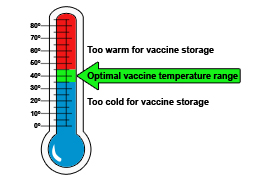 A vaccine program can help prevent many potential problems for producers. However, if vaccines aren't stored and handled correctly, the program can be ineffective.
A vaccine program can help prevent many potential problems for producers. However, if vaccines aren't stored and handled correctly, the program can be ineffective.
 "Vaccines are temperature sensitive," says Ron White, manager, technical services at Pfizer Animal Health. "Poor handling and incorrect storage can decrease the potency of any vaccine and can potentially make it ineffective."
"Vaccines are temperature sensitive," says Ron White, manager, technical services at Pfizer Animal Health. "Poor handling and incorrect storage can decrease the potency of any vaccine and can potentially make it ineffective."

Extreme temperature changes, both cold and hot, are harmful to vaccines. Vaccines that have killed antigens, or 'killed vaccines', contain an adjuvant to help enhance the immune response. If the vaccine gets too cold or freezes, the vaccine may undergo adverse changes to the adjuvant or antigen, resulting in a less effective vaccine and reduced immune response.
Warm temperatures and UV light can have negative effects on most vaccines and can cause them to become ineffective.
Thawing or re-cooling a vaccine that has been exposed to extreme temperatures won't restore to its original form. If the vaccine has been exposed to extreme conditions, it shouldn't be administered to the animal and should be disposed.
Labels typically suggest vaccines are stored between 35°-45° F. If the vaccine is kept at a temperature above or below the recommended temperature on the label, it could adversely affect the vaccine.
Handling
The effectiveness of the vaccine can also depend on handling. When a vaccine is developed, a minimum immunizing dose (MID) is established. The MID represents the amount of antigen that will be present in the vaccine dose at the expiration date. This helps give producers assurance that the vaccine will offer protection until the expiration date if handled correctly.
"Using freeze-dried vaccines can be a risk if proper handling methods aren't taken," says White. "Once the vaccine has been re-hydrated, poor handling can adversely affect it."
All vaccines suggest that immediate product use once opened is the best measure to ensure product potency. If the product isn't used immediately, the vaccine should be properly disposed. Vaccine stock should be rotated frequently. By rotating the vaccine stock, it helps reduce the risk of the vaccine becoming ineffective due to the expiration date being reached.
November 15, 2011 - Pfizer Animal Health


